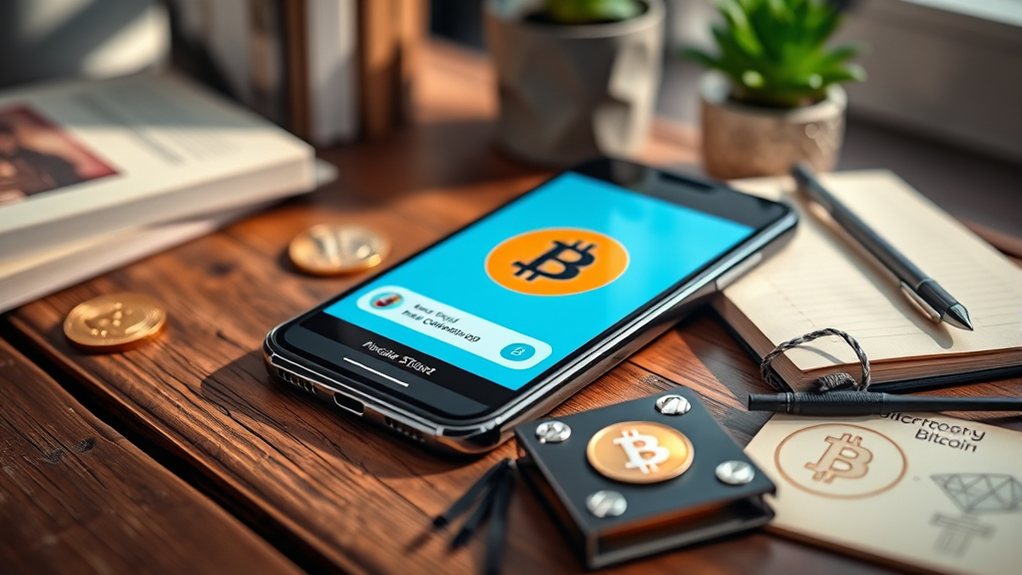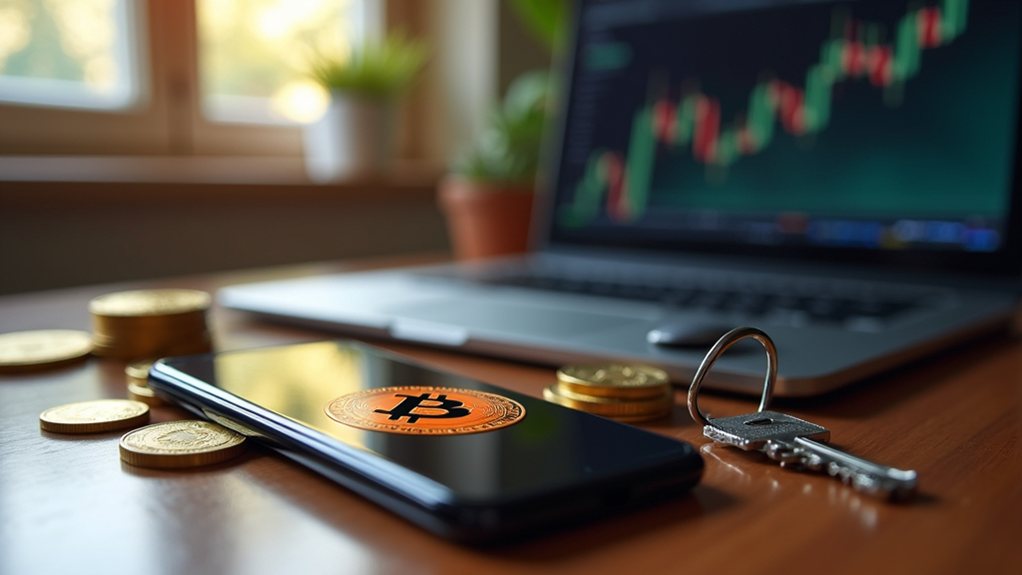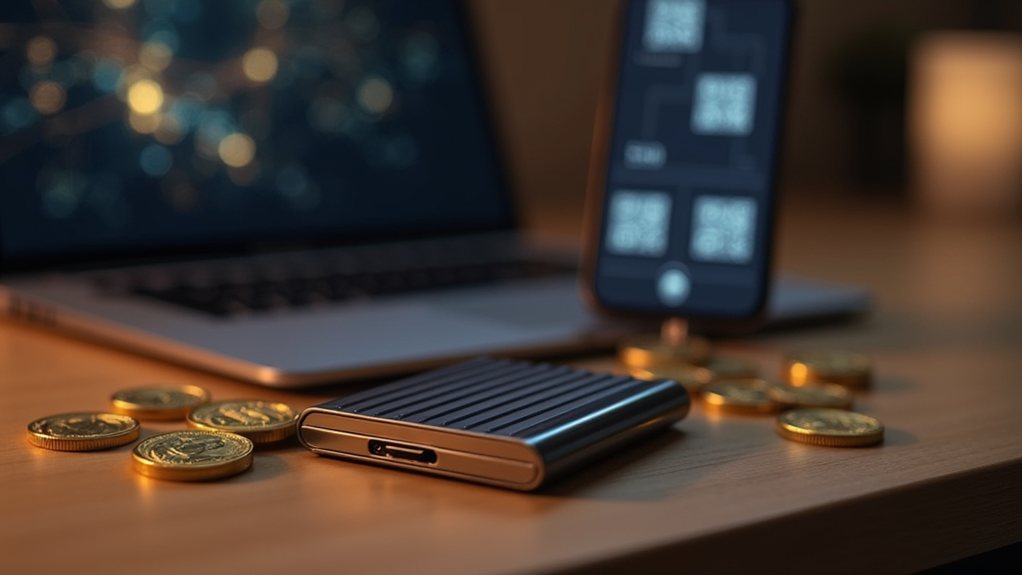Using Bitcoin requires a digital wallet, which stores your cryptocurrency securely. Users can buy bitcoins through exchanges, Bitcoin ATMs, or by accepting them as payment. To send funds, enter the recipient's address in your wallet app and confirm the transaction. For receiving, share your wallet address with the sender. Many merchants now accept Bitcoin payments, and specialized debit cards allow spending at traditional retailers. Additional security measures can protect your digital assets.

Maneuvering the world of Bitcoin doesn't have to be complicated. Bitcoin users begin their journey by creating a digital wallet. This wallet serves as a virtual account where bitcoins are stored. People download wallet apps on their phones or computers, or use online wallet services. Each wallet generates a unique public address for receiving funds. Security is critical, so users protect their wallets with strong passwords and two-factor authentication. They also back up their recovery phrases in multiple secure locations.
After setting up a wallet, individuals need to acquire bitcoins. The most common method is purchasing from cryptocurrency exchanges, where they can trade traditional currency for bitcoins. Some prefer using Bitcoin ATMs, which accept cash in exchange for digital currency. Others earn bitcoins by mining, providing goods or services, or receiving them as payments from other users. Peer-to-peer marketplaces connect buyers directly with sellers.
Bitcoin acquisition happens through exchanges, ATMs, mining, or as payment for services—diverse paths into the digital economy.
Sending bitcoins is straightforward. Users enter the recipient's Bitcoin address in their wallet app and specify the amount to send. They choose a transaction fee based on how quickly they want the transaction processed. Higher fees typically result in faster confirmations. After reviewing the details, they confirm the transaction and wait for it to be verified by the network. This verification process usually takes between 10 minutes and an hour.
Receiving bitcoin payments requires providing a Bitcoin address to the sender. For enhanced privacy, many users generate a new address for each transaction. Once a payment is sent, the recipient can verify receipt by checking their wallet or monitoring blockchain explorers. Businesses often use payment processors to streamline accepting Bitcoin payments from customers. When receiving Bitcoin, users are engaging with a currency that uses public and private keys as fundamental security elements.
Security remains paramount when storing bitcoins. For large amounts, hardware wallets provide superior protection by keeping private keys offline. Software wallets should have encryption enabled. Many long-term investors use cold storage, keeping their bitcoins completely disconnected from the internet. Regular software updates patch security vulnerabilities. Some choose multi-signature wallets that require approval from multiple parties for transactions. Users concerned about maximum security should consider investing in hardware wallets like Ledger that store private keys offline and protect against online threats. It's important to understand that Bitcoin wallets don't actually store the cryptocurrency itself but rather the cryptographic keys needed to access your Bitcoin on the blockchain.
Bitcoin's usability continues to expand. More merchants now accept Bitcoin payments for goods and services. Bitcoin debit cards allow spending at traditional retailers. Users convert bitcoins to gift cards for online shopping. Some pay bills or make donations using Bitcoin. Travel enthusiasts book flights and accommodations through Bitcoin-friendly services.
Many treat Bitcoin as an investment. They track price trends, set up recurring purchases to average their buying price over time, and use limit orders on exchanges. Some diversify by including other cryptocurrencies in their portfolios. All transactions create tax implications that require careful record-keeping. As Bitcoin adoption grows, more resources become available to help users navigate this digital currency landscape.
Frequently Asked Questions
Is Bitcoin Legal in My Country?
Bitcoin's legal status varies worldwide.
It's legal in 119 countries, illegal in 22, and has neutral status in 25. The answer depends on the reader's location.
In the US, it's regulated as property. In China, it's completely banned.
Countries like Japan recognize it as legal property, while El Salvador uses it as legal tender.
Specific regulations differ even where Bitcoin is legal.
Can Bitcoin Transactions Be Traced Back to Me?
Bitcoin transactions aren't completely anonymous.
They're recorded on a public blockchain that anyone can view. While transactions show only digital addresses, not names, these can be linked to real identities through various methods.
Exchanges that follow "know-your-customer" rules collect personal information. Law enforcement agencies use specialized tools to track suspicious activity.
Using new addresses for each transaction improves privacy, but perfect anonymity isn't guaranteed.
What Happens if I Lose My Wallet Password?
Losing a Bitcoin wallet password can be catastrophic. There's no "forgot password" button or customer service to help. When the password is gone, the Bitcoin is likely gone too. Some users have lost millions this way.
Recovery options include using backup seed phrases if they exist. Professional recovery services offer help but success rates are low. About 20% of all Bitcoin is locked away due to lost passwords.
How Do I Report Bitcoin Holdings for Tax Purposes?
Bitcoin holders must report their cryptocurrency on tax forms.
They need to list transactions on Form 8949 and Schedule D, and answer "yes" to the crypto question on Form 1040.
Any income from Bitcoin requires reporting on Schedule 1 or Schedule C.
Selling Bitcoin, trading it for other cryptocurrencies, or using it for purchases are all taxable events.
Detailed records of all transactions are essential.
Can Bitcoin Be Converted Back to Regular Currency?
Yes, Bitcoin can be converted to regular currency through several methods.
Cryptocurrency exchanges let users sell Bitcoin for dollars, euros, or other fiat currencies.
Bitcoin ATMs offer cash withdrawals in some locations.
Peer-to-peer platforms allow direct trades between individuals.
The conversion process typically involves creating an account, transferring Bitcoin, placing a sell order, and withdrawing funds to a bank account.
Fees and processing times vary by platform.














